
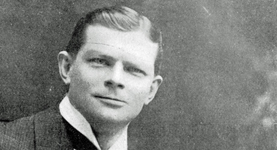
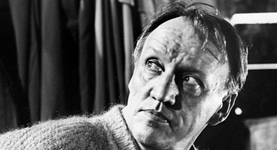
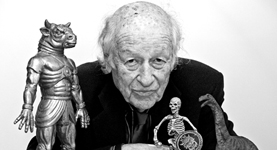
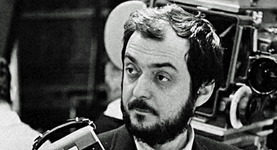
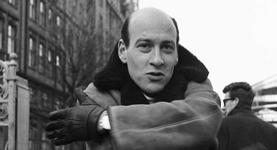
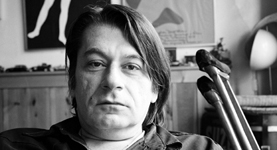
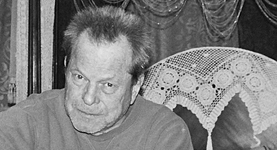
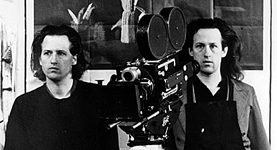
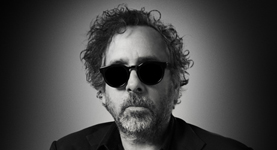
Comment is often made about the departure of British actors
and filmmakers to Hollywood to further their careers, yet less is made of
the artists who left America and made Britain their home.
Why did these filmmakers leave America and come to Britain? How did they find the United Kingdom on their arrival? How has their emigration affected their work? What influence have they had on British Film? What do they think of the US now?
Through extensive research and significant interviews with many of the émigré filmmakers, Phil Stubbs is currently documenting their fascinating stories and insights.
Why did these filmmakers leave America and come to Britain? How did they find the United Kingdom on their arrival? How has their emigration affected their work? What influence have they had on British Film? What do they think of the US now?
Through extensive research and significant interviews with many of the émigré filmmakers, Phil Stubbs is currently documenting their fascinating stories and insights.
Charles Urban (1867-1942)
"We arrived at Liverpool August 22nd 1897. This seemed as busy a port as New York. My first impression of England was that of a toy land, compared with the American countryside. The diminutive engine of the train we boarded, I expected would be unable to pull all the cars to London." (1)
"We arrived at Liverpool August 22nd 1897. This seemed as busy a port as New York. My first impression of England was that of a toy land, compared with the American countryside. The diminutive engine of the train we boarded, I expected would be unable to pull all the cars to London." (1)
Joseph Losey (1909-1984)
"The English market wanted to employ me because first, they knew that I knew my job; second, they got me very cheaply; third, they thought I would make pictures for the American market; fourth, they thought I would attract American stars; and fifth, in some sort of strange way they thought they could keep it all secret." (2)
"The English market wanted to employ me because first, they knew that I knew my job; second, they got me very cheaply; third, they thought I would make pictures for the American market; fourth, they thought I would attract American stars; and fifth, in some sort of strange way they thought they could keep it all secret." (2)
Ray Harryhausen (1920-2013)
"In those days they had what was called the Eady Plan, which also helped finance films here in England, so we took advantage of that. I've found it very pleasant to live here... I met my wife at my landlady's birthday party when I first came over here. We've been married since 1963, which wouldn't have lasted in Hollywood!" (3)
"In those days they had what was called the Eady Plan, which also helped finance films here in England, so we took advantage of that. I've found it very pleasant to live here... I met my wife at my landlady's birthday party when I first came over here. We've been married since 1963, which wouldn't have lasted in Hollywood!" (3)
Stanley Kubrick (1928-1999)
"I don't think he ever thought he had left the States permanently. He liked the lack of pressure and the distance from Hollywood, the British talent, and way of working and the relaxed style. Though once whilst in mid-take on Dr Strangelove, the sparks actually shut off the lights - as it was tea-time!" (4)
"I don't think he ever thought he had left the States permanently. He liked the lack of pressure and the distance from Hollywood, the British talent, and way of working and the relaxed style. Though once whilst in mid-take on Dr Strangelove, the sparks actually shut off the lights - as it was tea-time!" (4)
Richard Lester (1932-)
"It was just a stumbling out of something that I felt wasn't enough and wasn't right. Not knowing why, and suddenly going to a place where even in the most difficult circumstances of being bloody hungry and having no place to sleep and not being able to speak to most of the people properly, I felt this is where I should be. And the fact that I never went back would seem to justify those feelings." (5)
"It was just a stumbling out of something that I felt wasn't enough and wasn't right. Not knowing why, and suddenly going to a place where even in the most difficult circumstances of being bloody hungry and having no place to sleep and not being able to speak to most of the people properly, I felt this is where I should be. And the fact that I never went back would seem to justify those feelings." (5)
Stephen Dwoskin (1939-2012)
"The flats were damp, you never had a refrigerator. It was like going back to the turn of the century. But it was a utopia of freedom, openness, education and culture. A forward thinking social country... People weren't frightened of being eccentric - they didn't have to be cool. The builders didn't build, you couldn't get things fixed, you couldn't get your rubbish collected. Yet people helped each other in a much more immediate way." (6)
"The flats were damp, you never had a refrigerator. It was like going back to the turn of the century. But it was a utopia of freedom, openness, education and culture. A forward thinking social country... People weren't frightened of being eccentric - they didn't have to be cool. The builders didn't build, you couldn't get things fixed, you couldn't get your rubbish collected. Yet people helped each other in a much more immediate way." (6)
Terry Gilliam (1940-)
"It was very funny just wandering around being confused. It was like coming to a costume ball. London looked amazing then; people dressed so extraordinarily. London was much more decadent - antique lace, beautiful velvets, and I wanted to be part of that." (7)
"It was very funny just wandering around being confused. It was like coming to a costume ball. London looked amazing then; people dressed so extraordinarily. London was much more decadent - antique lace, beautiful velvets, and I wanted to be part of that." (7)
The Brothers Quay (1947-)
"We can adapt anywhere. We feel at home anywhere. Let us hit the sidewalks in any big European city and we're happy, getting lost in the streets. Maybe it's our twinhood but we're very safe within it. We can adapt to any situation any place; we wear our baggage light. We have a roving sensibility. We're good at not being American, actually." (8)
"We can adapt anywhere. We feel at home anywhere. Let us hit the sidewalks in any big European city and we're happy, getting lost in the streets. Maybe it's our twinhood but we're very safe within it. We can adapt to any situation any place; we wear our baggage light. We have a roving sensibility. We're good at not being American, actually." (8)
Tim Burton (1958-)
"I've always liked [England]. When I first came here to do Batman I loved living here and when I did Sleepy Hollow I loved it. I do feel more at home, I can't explain it... I'm semi-nomadic... England has always been a place I've gravitated towards and loved being here." (9)
"I've always liked [England]. When I first came here to do Batman I loved living here and when I did Sleepy Hollow I loved it. I do feel more at home, I can't explain it... I'm semi-nomadic... England has always been a place I've gravitated towards and loved being here." (9)
1. from "A Yank in Britain: The Lost Memoirs of Charles Urban, Film Pioneer" (1999), edited by Luke McKernan, The Projection Box
2. from "Conversations with Losey" (1985), edited by Michel Ciment, Methuen
3. Author interview with Ray Harryhausen
4. Author interview with Katharina Kubrick
5. Author interview with Richard Lester
6. Author interview with Stephen Dwoskin
7. Author interview with Terry Gilliam
8. Author interview with The Brothers Quay
9. from "Burton on Burton" (2006), edited by Mark Salisbury, Faber and Faber
For further information on this project, contact Phil Stubbs at phil@asylumproject.co.uk
2. from "Conversations with Losey" (1985), edited by Michel Ciment, Methuen
3. Author interview with Ray Harryhausen
4. Author interview with Katharina Kubrick
5. Author interview with Richard Lester
6. Author interview with Stephen Dwoskin
7. Author interview with Terry Gilliam
8. Author interview with The Brothers Quay
9. from "Burton on Burton" (2006), edited by Mark Salisbury, Faber and Faber
For further information on this project, contact Phil Stubbs at phil@asylumproject.co.uk